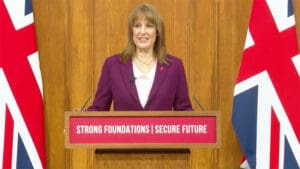Chancellor Rachel Reeves used a rare Downing Street address to lay the groundwork for her upcoming Budget, signalling that tough tax decisions lie ahead — but sought to pre-empt backlash by insisting the pressure on public finances “wasn’t our fault”.
In the speech, she said the UK economy was struggling not because of Labour’s policies but because of “longer-term factors” such as Brexit, decades of Tory austerity and rising global borrowing costs. “We must deal with the world as it is, not how we wish it could be,” she said.
Ms Reeves presented her forthcoming fiscal package as a choice between “investment and hope, or cuts and division”. She said she would do “what is right rather than what is popular”, placing emphasis on protecting the NHS, reducing national debt and improving the cost of living. But she also acknowledged that the measures required could mean pain for taxpayers — in particular the “wealthy” and property-owners — and carry consequences “for years to come”.
With the public finances projected to be weaker than expected, analysts estimate she may need to raise around £20 billion to £30 billion in additional revenue, despite last year’s historic tax rises.
Ms Reeves stressed that any future tax decisions were not being taken lightly: “Any Chancellor of any party would be standing here facing the choices I face,” she said, placing the blame squarely on previous governments and global shocks rather than her own policies.
She specifically cited a barrage of international headwinds — from US tariffs and conflicts in Europe to supply-chain disruption and jump-in borrowing costs — as having undermined Britain’s growth prospects. “The world has changed,” she said, “and we’re not immune to that change.”
Although she reaffirmed the manifesto promises not to raise VAT or tax working-people’s payslips, she stopped short of committing not to raise income tax, or altering thresholds — leaving open the possibility of a “wealth tax” or a hike in capital taxes.
Opposition parties seized on the remarks, warning that Ms Reeves was setting the stage for a significant tax raid disguised as a responsible Budget. Conservatives argued the Chancellor was laying the blame for her own ask on others.
With the next Budget scheduled for 26 November 2025, markets will be watching closely. Ms Reeves warned that if lenders and investors doubted her commitment to fiscal rules, the UK’s cost of borrowing could rise further — potentially forcing even deeper cuts or higher taxes.
In sum, the Chancellor has raised expectations of tough decisions while making it clear she will not be the one held solely responsible — outsourcing the blame to Brexit, austerity and global chaos. Whether the public accepts that framing — and whether her fiscal package delivers growth alongside the pain — remains the key question.
Read more:
Reeves shifts blame for looming tax rise to Brexit and austerity ahead of budgeting storm















